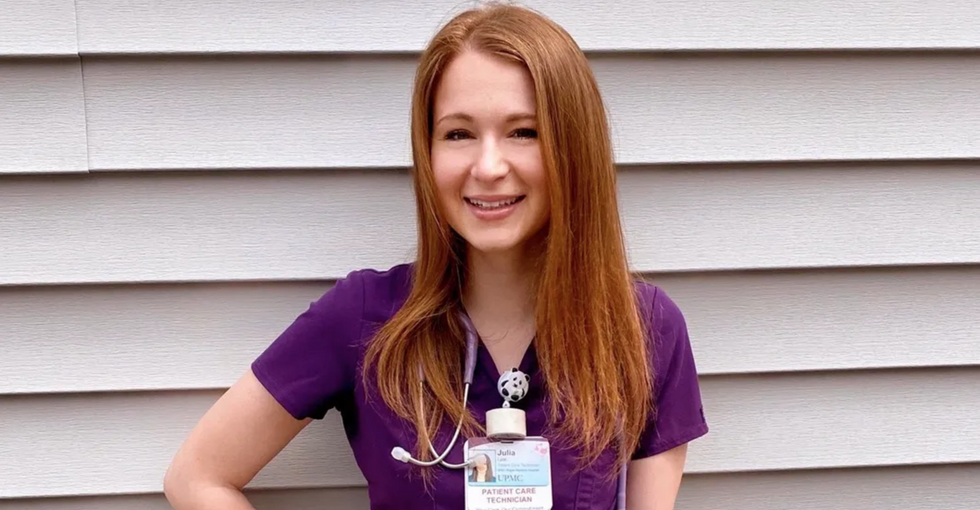It seems like the only thing I do these days is scroll through social media in a desperate attempt to gain information. My phone has called me out on my screen time more than once, and I just continue to ignore it. You're probably in the same boat — stuck at home, scrolling deeper and deeper into a hole of conspiracy theories and possible "back to normalcy" dates, hungry for information.
While we know that the news is not our mental health's friend these days, getting reliable information is helpful and necessary.
While the rest of us are home on our phones, healthcare workers are on the coronavirus (COVID-19) front line every single day. They see what we read snippets of, quickly gaining the perspective that we couldn't fathom. That's why we're going to the root of the information — these healthcare workers who put their own safety at risk every single day.
Today, I virtually sat down (virtually) with Julia Lyon, a patient care technician working in Pittsburgh, Pennsylvania.
How long have you been a nurse?
I currently am in school to become a nurse and will be entering the workforce upon my graduation this May. Right now, I am a patient care technician — I have been working as a PCT in Pittsburgh for the past year.
What department do you work in?
I work in recourse at my hospital which involves, floating to all areas including labor and delivery, NICU, mother and baby, antepartum, ICU, PACU, ED, oncology, and med-surg units.
What is your hospital's procedure in regard to COVID-19 patient care?
Currently, each unit has four rooms blocked off, all of which are located behind another door. When going into the rooms to care for the patients, all nurses are wearing N-95 masks — each unit also has designated nurses who will be on the COVID-19 team for the week. These nurses will exclusively be working with these patients. As a PCT, the nurses are instructed to provide most of the patient care, since the ratio for PCT to patient is much higher.
What is the protocol if you (or another nurse) shows signs of infection?
Send them home. Nurses and PCTs have been sent home for something as small as a cough. They are then followed up with and tested before returning to work.
SEE ALSO: 10 Tweets From Nurses On The Front Lines Of The Coronavirus War That Will Break Your Heart
Do you have enough PPE (personal protective equipment)?
When you walk into the hospital, you immediately have your temperature checked, then you are given a mask. The only problem is, we only get one mask for the entire shift. Personally, I also wear a hair net when I am in the hospital, but again — only one per shift.
What is the biggest change your day-to-day has faced because of COVID-19?
One of the biggest changes I noticed as a PCT is how understaffed we are. Most people are picking up overtime. Many PCTs are students and have gone home to be with their families — the hospital allowed that, but it caused understaffed units.
If you were to describe your hospital's atmosphere in one word, what would that word be?
Positive.
How do you feel about the national news coverage of COVID-19? Accurate? Downplaying the situation?
As of right now, I feel the news is pretty accurate. Although, you really do get a different experience and perspective when you are physically working in a hospital and caring for those in the situation.
What is one thing you wish you could tell the country about COVID-19?
This virus is no joke. When you're asked to wear masks in public and participate in social distancing, you really need to do so. It may feel "weird" but it is the safest way to protect yourself and others.
You have to think about everyone around you, not just yourself.
How is your personal life impacted by COVID-19?
Unfortunately, it is really impacting my life with my family. I am a senior in college and I live in Montgomery County — right outside of Philadelphia — but I go to school and work in Pittsburgh. My parents and I have discussed it and feel that since Montgomery county is a hotspot for the virus, it is safest for me to stay in Pittsburgh and continue to work. This ultimately caused me to not go home for Easter, which is a huge change for my family.
What advice would you give us for staying as healthy as possible?
Hand sanitizer is good, but washing your hands is better. Wash your hands whenever possible!
What can citizens in your area do to help healthcare workers fight COVID-19?
Decrease the amount of visitors you bring to the hospital!
If you are a healthcare professional interested in sharing your story, please email lily.moe@theodysseyonline.com.
As an Amazon Affiliate partner, Odyssey may earn a portion of qualifying sales.























